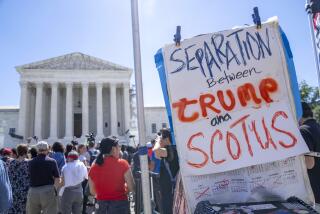Charges Against Suharto Dropped
- Share via
JAKARTA, Indonesia — In a major setback for Indonesia’s democracy movement, a court ruled Thursday that former dictator Suharto is too ill to stand trial on corruption allegations and dismissed all charges against him.
After hearing hours of testimony from an independent medical team, the panel of five judges concluded that the 79-year-old Suharto had suffered such extensive brain damage from a series of strokes that his trial could not go forward.
The judges rejected a request from prosecutors that the former ruler be tried in absentia and ordered him freed from house arrest. Atty. Gen. Marzuki Darusman said prosecutors will appeal the decision to the nation’s Supreme Court.
Anti-Suharto protesters, who had earlier set fire to a bus carrying pro-Suharto demonstrators, responded to the ruling by throwing stones and Molotov cocktails. One Suharto supporter reportedly was killed. Police fired tear gas and warning shots to break up the crowd, which continued protesting near Suharto’s house long into the evening.
Officials fear that the court decision could spark further unrest among student demonstrators, whose protests in 1998 helped bring down Suharto after more than three decades of authoritarian rule.
Dr. Zakaria, head of the court-appointed medical team that examined Suharto for 10 hours Saturday, told the judges that the ex-dictator can no longer “understand complex ideas.”
“Based on neurological and psychiatric tests, Suharto has trouble expressing himself,” said Zakaria, who, like many Indonesians, goes by only one name. “When he speaks, he stops often and uses sign language.”
Prosecutors accused Suharto of stealing at least $571 million from charities he controlled while he was Indonesia’s president and of diverting the money to family members and friends. His critics say the amount is a small fraction of the fortune he stole from the country during his reign. His attorneys say he never took any money illegally.
Though Indonesian law requires a defendant to be present during his or her trial, legal experts said the court had the authority to make an exception and allow Suharto to be tried in absentia. Instead, the judges--all appointed during the Suharto era--chose the alternative most favorable to the former ruler.
“This is a big disappointment,” said attorney Albert Hasibuan, chairman of the Indonesian Jurists Assn. and a member of the Indonesian Human Rights Commission. “The Suharto case has become a symbol of abolishing corruption in Indonesia, and because of that the court should have resolved this case.”
The trial has turned into a battleground over the course of change in this equatorial nation, which ranks fourth in the world in population and sits astride important shipping lanes between the Pacific and Indian oceans.
Many Indonesians and much of the international community hope that democracy can take hold under President Abdurrahman Wahid, who was installed 11 months ago following the country’s first free election process in decades.
Suharto’s supporters and the military, which had extraordinary influence under the old regime, still wield considerable power. By putting Suharto on trial, the government had hoped to consolidate the nation’s fledgling democracy.
In recent weeks, Indonesia has been racked by violence. Militia members hacked three U.N. aid workers to death in the province of West Timor. Fighting between the military and separatist rebels in Aceh province has killed dozens, and conflicts in other provinces dozens more.
Here in the capital, key steps of the Suharto case have coincided with bombings. Two weeks ago, on the day before Suharto was scheduled to appear in court, a car bomb exploded in the underground garage of the Jakarta Stock Exchange, killing 15 people.
On Wednesday night, hours before Suharto’s most recent hearing was to start, a small bomb caused minor damage at the office of Kontras, a leading human rights organization that has focused on cases of kidnappings and violence by the military.
Prior to the latest explosion, police arrested about 30 people and charged them with carrying out the recent wave of bombings. Police said that two were soldiers but that most were supporters of the Aceh independence movement. Oddities in the police account, however, have raised questions as to whether the real culprits have been arrested.
After the stock exchange bombing, Wahid raised the stakes in his battle with the Suharto forces by ordering the arrest of Suharto’s youngest son, Hutomo Mandala Putra, for complicity in the bombings. After police questioned him and let him go, Wahid fired the police chief.
Earlier this week, the Supreme Court reversed a lower court decision and found Hutomo, commonly known as Tommy Suharto, guilty in an $11-million land scam. The high court sentenced him to 18 months in prison, and authorities said they planned to arrest him by Monday. Hutomo’s lawyers charged that Wahid used undue influence on the judges to have the decision reversed.
Legal experts and human rights activists have questioned the government’s strategy of trying the elder Suharto only for corruption and not for human rights abuses. Hundreds of thousands of people died at the hands of government forces during his brutal rule.
Many of the Suharto’s foes do not believe he is as sick as the doctors and lawyers say. They want him tried, convicted and sent to prison. After dozens of arrests and injuries in Thursday’s street violence, police said they will prepare for protests.
“I’m not surprised people are burning buses,” said J. E. Sahetapy, a member of parliament and chairman of the National Law Commission. “Our whole court system is tainted with corruption.”
More to Read
Sign up for Essential California
The most important California stories and recommendations in your inbox every morning.
You may occasionally receive promotional content from the Los Angeles Times.










